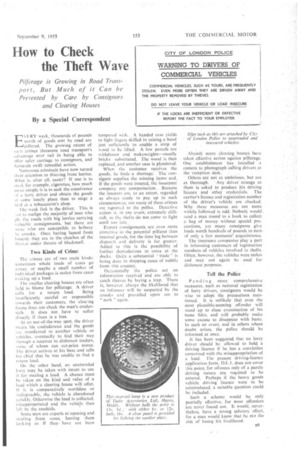How to Check
Page 43

If you've noticed an error in this article please click here to report it so we can fix it.
the Theft Wave
By a Special Correspondent
F11,,ERY week, thousands of pounds worth of goods sent by road are pilfered. The growing extent of ,-kkell crimes threatens road transport's Advantage over rail in being able to offer safer carriage to consignors, and demands swift remedial action.
Numerous criminals have now turned [heir attention to thieving from lorries: What is. after all, easier? If one is to sieni. for example, cigarettes, how much more simple it is to seek the connivance 4 a lorry driver and obtain the goods .if Nom e lonely place than to stage a
raid at a tobacconist's shop. , The weak link is the driver. This is lot to malign the majority of men who ph the roads with big lorries carrying valuable consignments, but there arc :nine mho are susceptible to bribery 'ay crooks. Once having lapsed from honesty they are in the clutches of the thiex es under threats of blackmail. •
Two Kinds of Crime
The crimes are of two main kinds: sometimes whole loads Of cases go astray, or maybe a small number of indix idual packages is stolen from cases making up a load. .
I-he smaller clearing houses are often held to blame for pilferage. A driver calls for a return load. Being insufficiently careful or responsible towards their customers, the clearing house does not check the man's credentials. It does not have to suffer directly if there is a loss.
At an out-of-the-way spot, the driver meets his confederates and the goods are transferred to another vehicle or vehicles, eventually to find their way. .lirough a receiver to dishonest traders, --lane of whom run cut-price. stores. The driver arrives at his base and tells his chief that he was unable to find a return load.
On the other hand, an unattended lorry may be taken with intent to use it for stealing a load. A chance must be taken on the kind and value of a load \\Ilia a clearing house will offer. If it is comparatively worthless or indisposable, the vehicle is abandoned quickly. Otherwise the load is collected, misappropriated and the vehicle then left by the roadside.
Some men are experts at opening and stealing from cases, leaving them looking as if they. have not been
tampered with. A banded case yields to light fingers skilled in raising a band just sufficiently to enable a strip of wood to be lifted. A few parcels are withdrawn and makeweights—usually bricks substituted. The wood is then replaced, and another case is plundered.
When the customer receives the goods, he findsa shortage: The• consignor supplies the missing items: and, if the goods were insured, the insuranee company pay compensation. Because the insurers are, to an extent, regarded as always ready to pay. up in such circumstances, aof many of these crimes are reported to the police. Detective action is, in any event, extremely difficult, as the thefts do not come to light until too late.
Export consignments are even more attractive to the potential pilferer than internal goods, for the time lag between dispatch and delivery is far greater. Added to this is the possibility of further depredations to cases at the ducks. Quite a substantial trade is being done in shipping cases of rubble from this country. . • Occasionally the police act • on information received and are able to catch thieves by laying a trap. There is, however, always the likelihood that an informer will be suspected by the crooks and prevailed upon not to " nark " a ea in. Already many clearing houses have taken effective action against pilferage. One establishment has installed a camera to photograph Calling drivers at the reception desk. .
Others are not as ambitious,. but are
as thorough, Any driver. strange to them is asked -to produce his driving licence and other credentials. The Carrier's licence and registration number of the driver's vehicle are checked. Why these measures are not more widelyfollowed is odd. Nobody would send a man round to a bank to collect it bag of money . without special precautions, yet many consignors give loads worth hundreds of pounds to men, of only a few moments' acquaintance.
The insurance companies play a part in informing custorhers of 'registration numbers of vehicles involved in thefts. Often, however. the vehicles were stolen and may not again be used for dishonest purposes.
Tell the Police
Pending more comprehensive measures, such as national registration of lorry drivers, consignors would be wise to adopt the precautions mentioned. It is unlikely that even the most plausible-seeming offender will stand up to close examination of his bona fides, and will probably make some excuse to disappear with haste. In such an event, and in others where doubt arises, the police should be informed at once.
It has been suggested that no lorry driver should be allowed to hold a driving licence if he has a conviction coneerned with the misappropriation of a load. The present driving-licence application form, does not cover this point, for offences only of a purely driving nature are required to be entered. Perhaps if the heavy goods vehicle driving licence were to be reintroduced, a suitable question could be included.
Such a scheme would be only partially effective, for most offenders are never found out. It would, nevertheless, have a strong salutary effect, for a man would know that he ran the risk of losing hi livelihood.




























































































